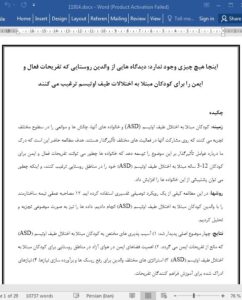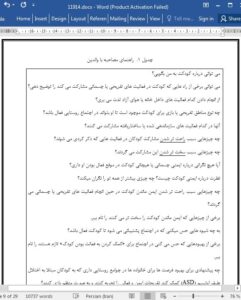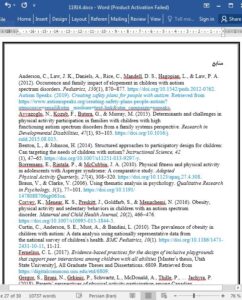Abstract
Background Children with autism spectrum disorder (ASD) and their families experience challenges and barriers at multiple levels that influence their activity participation. The purpose of this study was to develop understanding about factors influencing how families can promote safe, active recreation for their children 3–12 years living with ASD across rural settings and how supports for these families can be enhanced.
Methods This qualitative study used an interpretive descriptive approach. Twelve in-depth, semi-structured interviews with parents of children with ASD were conducted. Data was analyzed thematically.
Results Four main themes emerged: 1) ASD specific child vulnerabilities impeding safe recreation. 2) Importance of safe outdoor spaces in rural settings for children with ASD. 3) Diverse parent strategies to address risks and needs. 4) Perceived needs for training of recreation providers.
Conclusion Findings highlight family-centred priority issues including parental safety concerns related to elopement and risk of injury linked to environmental and outdoor hazards prominent in rural settings. Autism awareness and recreational training is needed and could incorporate collaborative development of child specific safety plans to foster inclusive opportunities. Program planners can use this information to encourage policy making to aid families’ safe activity participation.
5. Conclusion
This study highlights parental experiences and expressed needs for promoting safe recreation participation for their children living with ASD in rural settings. Practical strategies for addressing these needs that can be implemented at community and recreation program levels have been suggested. This research offers new understanding of parents’ perspectives and the unique safety concerns surrounding recreational participation for their children with autism in rural contexts. Moreover, this study represents a familycentred voice reflecting rural perspectives and provides a novel contribution to the literature. These findings provide an important foundation for future program and policy development to support families and children living with ASD to engage in recreation and sport in their communities. Improved participation in recreation can contribute to the health, safety, and quality of life of children with ASD and their families. Future directions for research are also suggested. Children living with ASD should have opportunities to experience safe inclusive recreation no matter their differing abilities, needs, or settings in which they live.










